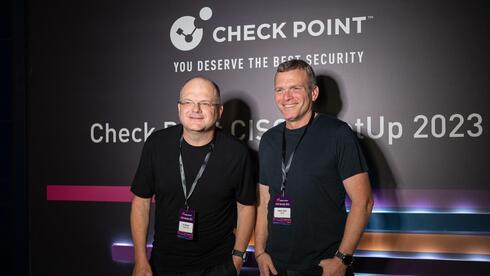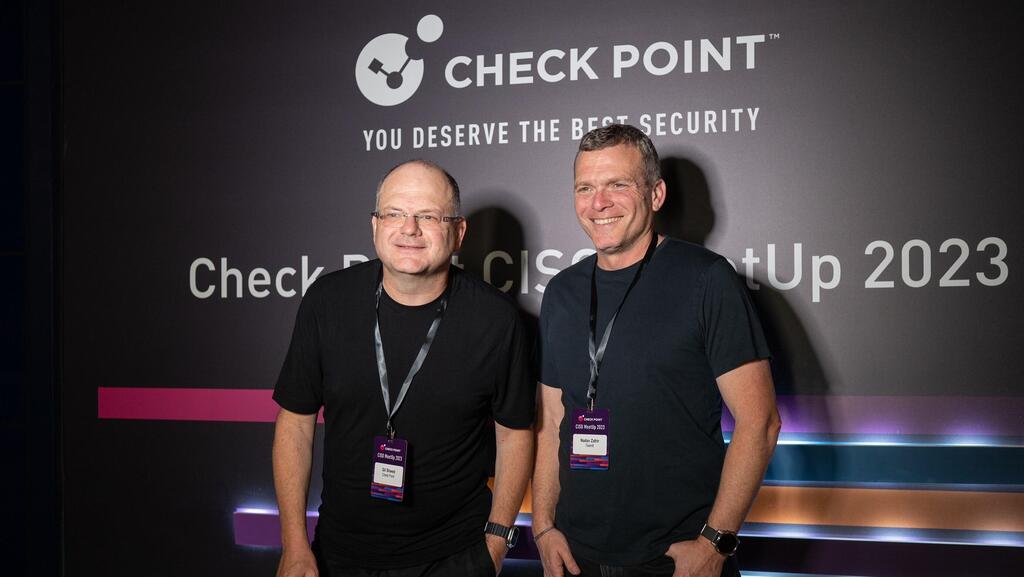
Analysis
Check Point CEO: “I wouldn’t have taken the job if I didn’t think we could close the gap with Palo Alto”
After Gil Shwed built Check Point into Israel’s most valuable company with $1 billion in annual profit but slow growth, new CEO Nadav Zafrir tells investors: “We need to take risks and move faster.”
Nadav Zafrir’s first earnings call with Wall Street investors in his new role as CEO of Check Point went smoothly—better than expected. Investors seem willing to overlook his fall as chairman of SolarEdge, which is in deep crisis, and are focusing instead on the vision he presents for the cybersecurity company’s future. Check Point’s shares jumped 7% on Thursday following the release of its 2024 financial results, marking the final year of founder Gil Shwed’s tenure as CEO. This surge solidified Check Point’s position as Israel’s largest company, with a market value of $24 billion, once again surpassing Teva, whose shares declined after a weak profit forecast for 2025.
Since Check Point announced Zafrir’s appointment six months ago, its shares have climbed about 40%, driven by expectations of a fresh approach after Shwed’s more than 30-year leadership and by Zafrir’s strong reputation in the global cybersecurity market, rooted in his past as commander of the elite intelligence Unit 8200 and as co-founder of Team8. However, until now, Zafrir had limited direct engagement with the capital markets. On Thursday, for the first time, he led the analyst call following Shwed’s official transition to executive chairman, formally passing the baton to Zafrir.
"Nadav and I are on a honeymoon"
“Since our IPO in 1996, we’ve grown from $10 million in annual sales to $2.5 billion in 2024, and profits have risen from $5 million to $1 billion—a milestone we crossed for the first time this year. The share price has increased 80-fold since the IPO, so I can confidently say it’s been a period of tremendous growth,” said Shwed, summarizing a tenure few founders and CEOs worldwide can match.
“Nadav has been CEO for a month and a half, but I still come to the office every day. Personally, I really enjoy taking a step back, relieving some pressure, and thinking more strategically about the future. Right now, Nadav and I are in the honeymoon phase of our working relationship, and I hope it stays that way,” Shwed quipped—an unusually light-hearted remark from him, given his typically reserved style during his years as CEO.
A strong legacy but tough challenges ahead
Despite Check Point’s status as one of the most profitable companies on Wall Street, Zafrir faces significant challenges. While Shwed was a pioneer in the cybersecurity field, younger, more aggressive competitors have overtaken Check Point in both market value and sales. The most prominent example is Nir Zuk’s Palo Alto Networks, which has surpassed $10 billion in annual revenue and achieved a $100 billion valuation.
When asked whether he believes Check Point can close the gap with Palo Alto, Zafrir replied firmly, “I wouldn’t have taken the job if I didn’t think we could close the gap.”
Shwed earned a reputation as a talented manager known for avoiding bold risks and maintaining exceptional profitability—around 89% gross margins and nearly 50% net margins. However, this focus on profitability came at the cost of slower growth. Zafrir inherits a company with nearly $3 billion in cash, around 100,000 customers (including many of the world’s largest organizations), but with a small share of the cloud security market, which has been dominated by younger competitors. Growth has been stagnant, particularly in the U.S.
“Getting closer to customers”
Since taking office in mid-December, Zafrir has signaled his intent to implement significant changes. His first priority is restructuring Check Point’s marketing and sales operations to get closer to customers and better understand their needs. This marks a departure from the company’s long-held belief that superior technology alone—rooted in Shwed’s expertise—would naturally attract clients.
Zafrir has flattened the organizational structure within marketing and sales to foster closer connections with customers. Additionally, he expanded the management team, increasing the number of senior marketing executives from two to six.
“In recent months, I’ve met with Check Point customers and partners to understand their key challenges in today’s unprecedented cyber threat landscape,” Zafrir said. “I’m making management changes to ensure that both I and the leadership team stay closer to our customers, understand their concerns, and adapt our products and communication strategies accordingly.”
Check Point’s biggest challenge—and opportunity—lies in the U.S. market, where growth has stalled. Most of its recent gains have come from the Asia-Pacific region. The company has tried to break out of stagnation through acquisitions, including Avanan (which brought Check Point into the email security market) and Perimeter 81 (expanding into cloud-based remote access management). However, growth remains slow, hovering in the single digits. In 2024, revenue grew by just 6%, and the 2025 forecast of $2.7 billion reflects a similar growth rate.
“We need to take risks and move faster,” Zafrir acknowledged. “But competitively, we’re starting from a strong position. The marketing spend in cybersecurity has gotten out of proportion, and some companies have lost sight of the fact that the ultimate promise is security.” Criticizing the flood of startups focused on the cloud market, he added, “But I understand that we need to prioritize that as well.”
Betting on AI
Zafrir’s second strategic focus is artificial intelligence, which is reshaping the cybersecurity landscape—both by enabling new types of attacks and by creating opportunities for defense, where Check Point aims to lead. He announced the establishment of a new AI research center, which will operate from a dedicated building on Leonardo da Vinci Street in Tel Aviv. Symbolically, the building had been loaned to the Hostages and Missing Families Forum, with Check Point hoping it will soon no longer be needed as all hostages return home.
“Our advantage in cybersecurity is significant, but we can’t afford to be complacent,” Zafrir said. “In the coming year, we’ll be recruiting top talent both in Israel and globally. The process has already begun, and the conditions will be competitive because we need the best people. This is crucial and will involve significant investment.”
The honeymoon won’t last forever
Zafrir’s first two strategic pillars are clear. For now, both he and Shwed are optimistic, and the capital markets are responding positively. But the true test lies ahead—not only in Zafrir’s leadership capabilities (given that his largest prior role was commanding a military unit, not a corporation) but also in how long the harmonious dynamic with Shwed will last.
The shift in marketing strategy and the aggressive talent recruitment will be costly and could impact the profitability that Shwed so rigorously protected. Investors will be watching closely in the coming quarters for signs that Zafrir’s strategy is taking hold and that he’s operating as an independent CEO—not just executing the vision of a dominant chairman.
For now, Shwed has reason to be pleased: the 7% stock surge on Thursday added $400 million to the value of his holdings, bringing his stake to $6 billion. He still owns about a quarter of Check Point, making Zafrir’s role both influential and uniquely complex.














